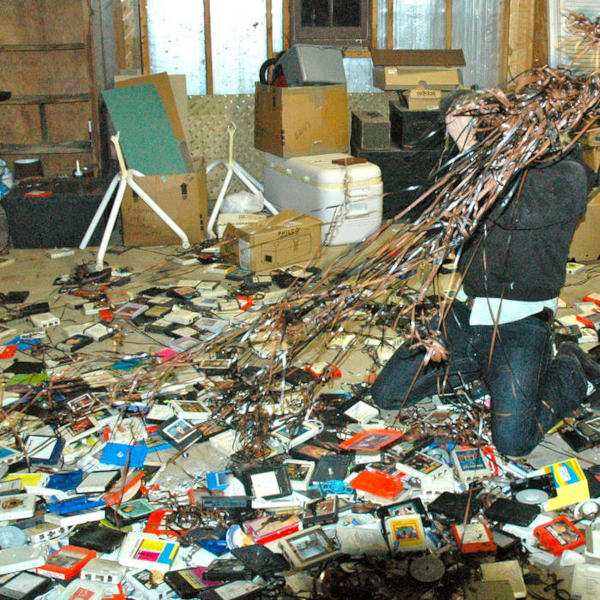
We are starting a new series – “On Tape”. And as the title suggests, this small series of articles is all about the medium of cassette. More specifically, the focus should be on the people in Leipzig in whose work the cassette plays an important role. Be it as a label, in production or in any other way. Let’s start with shell tapes.
Shell Tapes are three nice people who run a small recording studio for cassettes and regularly produce tapes for other labels and artists. I meet Max, Nathalie and Sven in their creative space on Riebeckstrasse in the east of Leipzig – a mix of workshop, co-working space, recording studio and small “tape factory”. This place combines all of this under one roof, which is called the “Aquarium”.
First of all, for everyone who doesn’t know you or this place. Where are we here, who are you and what are you doing here?
Sven is one third of Shell Tapes and also runs the tape label Golden Doom Records, a cassette label for experimental music. “GDR” is a platform for local musicians, where everything is allowed here, from experimental Kraut Jazz or LoFi ambient to noise punk. He also makes music himself under the name Multimedia Schneider, runs the recording studio in the aquarium together with Max and also works at the ZiMMT (Center for Immersive Media Art, Music and Technology).
Max releases experimental electronic music on tape on his label Prepaid Records (he himself calls it “abstraction on the analogue medium”) and produces under the pseudonym ahabzutun. He also releases physical mixtapes with changing artists (prepaid radio), which are recorded and produced in the sound and dubbing studio. Everything is included here, from classic DJ sets to analogue live sets.
The third in the group is Nathalie. She plays under the alias Valeska, is a booker for the Pracht and the Trip Festival, studies photography at the HGB and is currently planning her own, musically experimental event series at the IfZ called rewind. It is scheduled to start in November. She came to Shell Tapes through a DJ mixtape she recorded for Max at the Aquarium a few years ago.
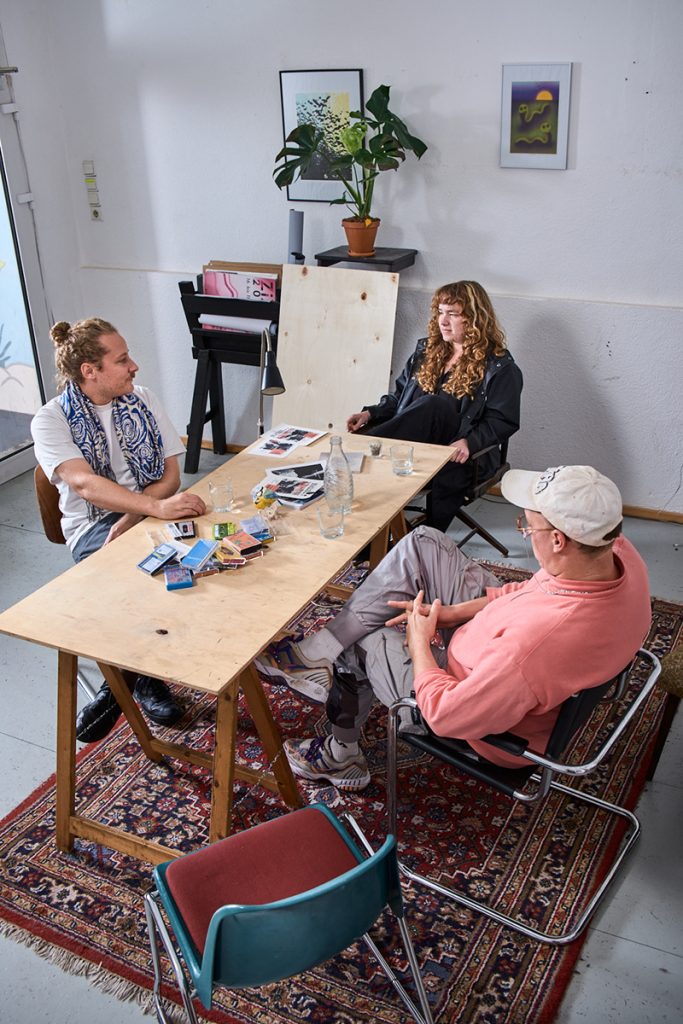
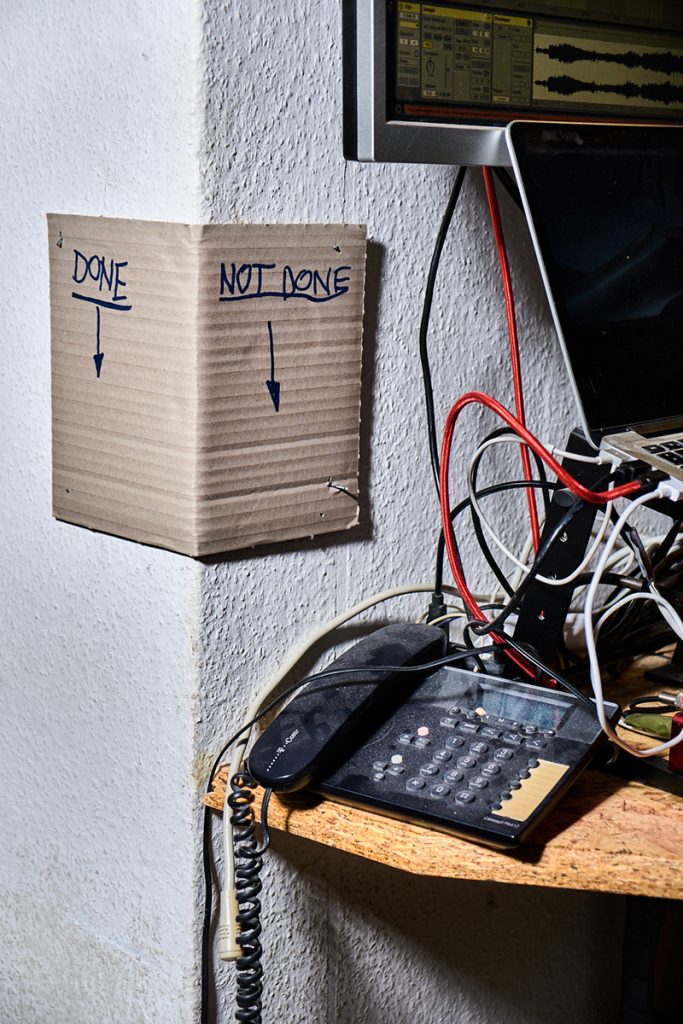
We sit and talk together in the place where a lot of this is created and comes together.
“The aquarium is an interdisciplinary, open space for connecting music,
visual arts, literature and technology.” – Max
“It consists of a co-working space, a music studio, which also houses the tape
Dubbing takes place and a workshop where we repair things (…). We also offer people the opportunity to repair things there themselves. We also have a 3D printer that we use to produce parts ourselves (…).” – Sven
I also learn that concerts, readings and workshops take place regularly in the aquarium. For example, a workshop called “Heavy Wires” is all about building electronic musical instruments and sound generators. Changing lecturers explain how, for example, you can build your own oscillator or a device like the “Atari Punk Console”. And of course cassettes are made here in the aquarium.
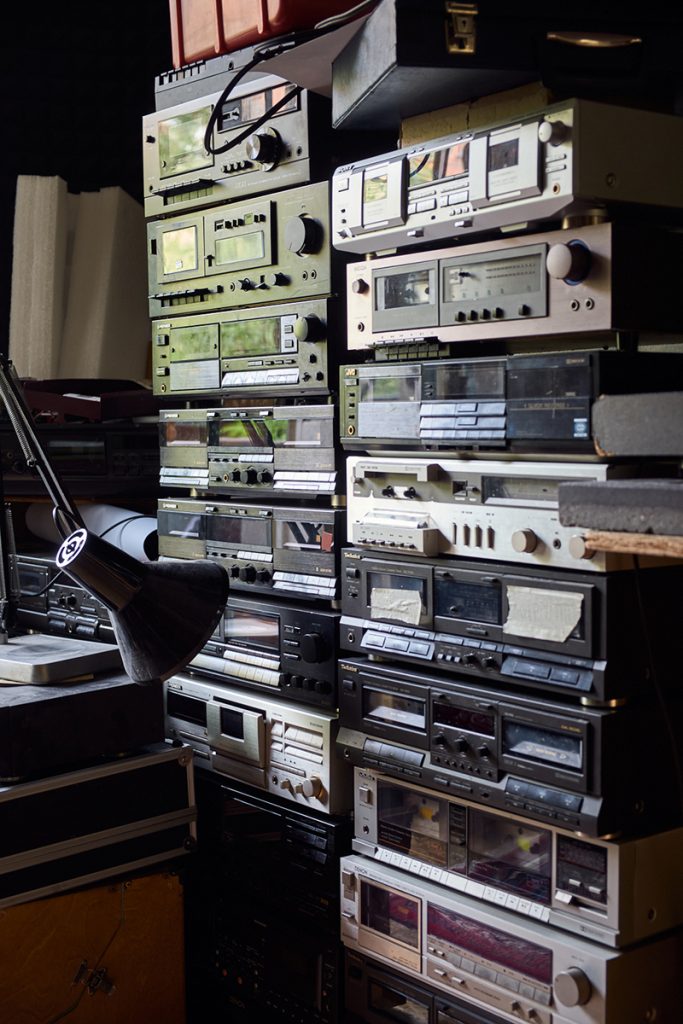
What immediately catches the eye when you enter the aquarium is a very large shelf full of tapes. A small showcase of material that has already been produced here. Everything in “real time”, as they explain to me. This means that it can be recorded simultaneously on forty tape decks of the same type connected in parallel. So not just one copy of a cassette, but forty copies are produced in one fell swoop. The decks are self-maintained and repaired if necessary. Everything here screams DIY at a very high level.
But why cassette? A medium that seems somehow retro and perhaps simply impractical for some? Sven says:
“For me it came from making music. I had been experimenting with tape loops and thought: Wait a minute, you can play your own music on tape. I had already bought a small stack of tape decks for recording, only to realize at a concert I played with Max that he had already done exactly that.”
The production of cassettes is low-threshold and cost-effective, he adds. A way to easily and quickly distribute your music to friends. Records are often expensive to produce and you have to expect long waiting times. In addition, only requirements in areas that often make no sense are worthwhile. The audience is too small for that and the publications are too special.
But it’s also about drawing attention to something that doesn’t happen on Spotify or Bandcamp, let alone find its way onto a record. There is also the special sound of a cassette, which should not be underestimated.
“Tape sounds cool. A special quality that resonates. Which, objectively speaking, may not be that good, but in my opinion it is underestimated and brings a nice, analog warmth (…).” – Sven
But there is another motivation for the three of them to release music on cassettes and bring recordings to the people:
“For me it has almost become a political act. My impression is that in the last 10-15 years there has been an extreme devaluation of music and extreme changes in music consumption behavior. That a kind of culture has established itself that no longer recognizes that music was produced by people who put their time, energy and creativity into it.” – Max
Max calls the music market in its current form a dystopia for producers. The idea of the tape could be understood as an act of self-empowerment by artists, small labels and groups that come together to release music. As an idea that can be countered by this madness.
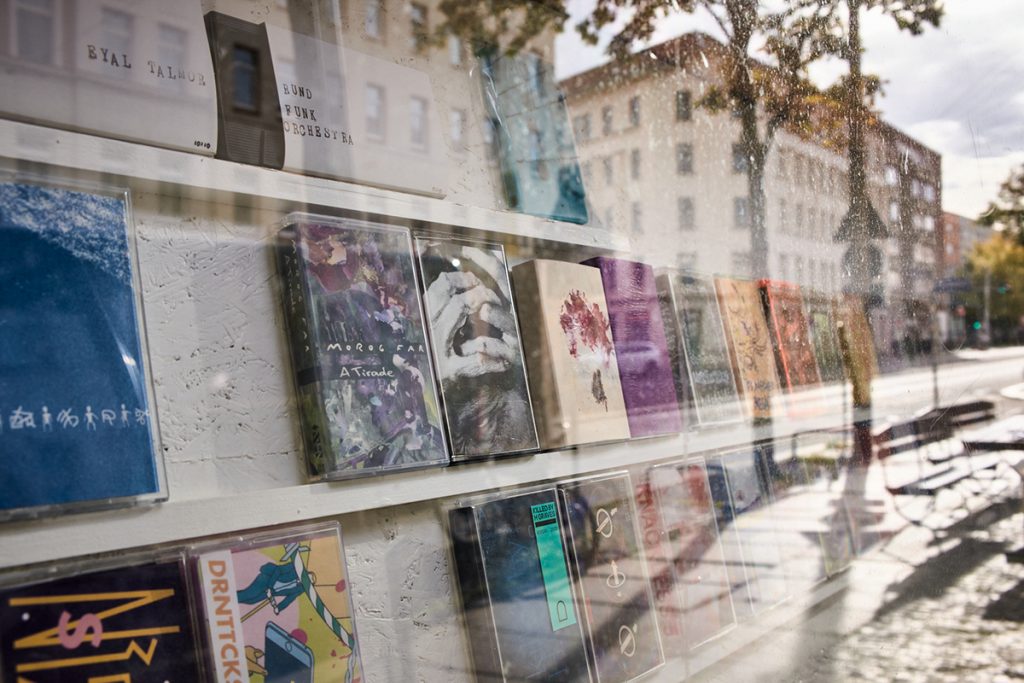
What I notice when I occasionally stop by record stores or browse merch tables is that the presence of cassettes has increased. Even larger acts and labels, sometimes even major commercial productions, often have tape issues of current releases to offer. Is there a comeback of the cassette or even a little hype like you hear from time to time?
“What we notice is that our production numbers are increasing every year”says Max. And how is this perceived from the perspective of a DJ and booker?
“I only know two people who DJ with tapes (…). Otherwise, the genres are
the ones I travel in are relatively tape-heavy. I don’t know how to define this, perhaps as a dystopian cinematic post-club noise sound. Almost all of the people whose music I really like, who I invite to events and who play on tape myself (…) publish here. In my experience, pop culture doesn’t necessarily happen on tape.” – Nathalie
Sure, maybe the Pet Shop Boys will release their new album on cassette or the “Guardians Of The Galaxy” mixtape from the film of the same name will actually be sold as merch. The share of physical recordings in the music market in general – and especially the share of cassettes – is negligible, Max adds on the topic.
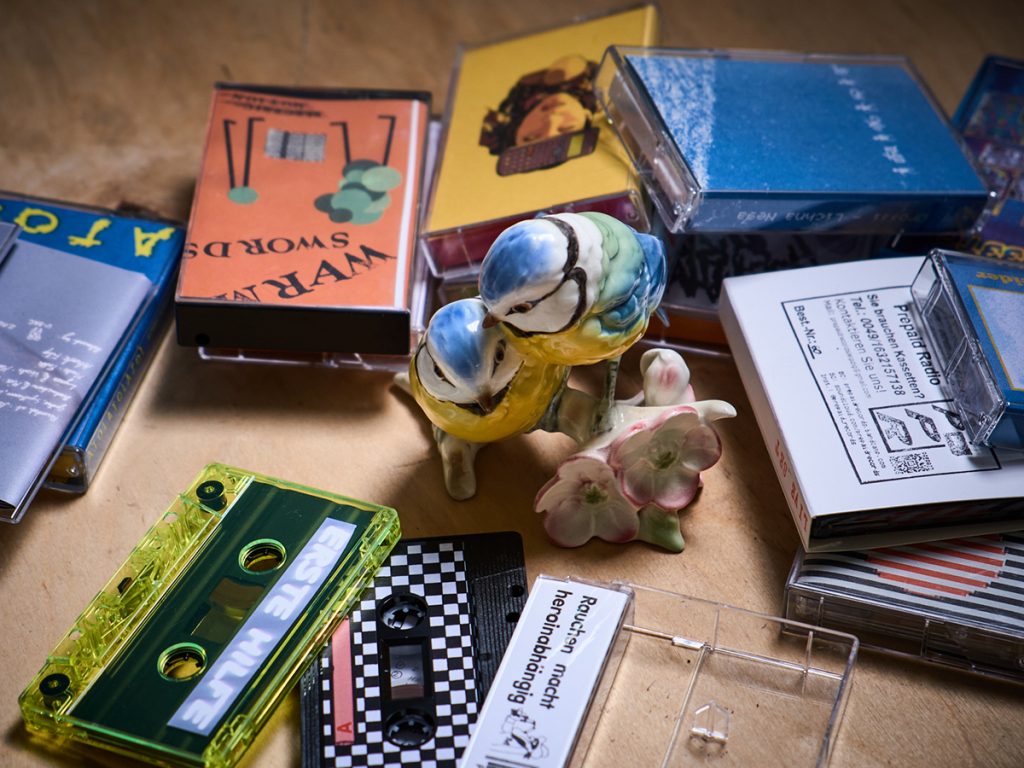
Anyone who has ever thought about recording a cassette in Leipzig will have come across the name TAPE Muzik, the small sub-company of the record production facility RAND Muzik.
Recording on cassettes is also offered here. Inlays and covers can also be printed here, accessories can be purchased and a variety of cassette colors can be selected. What actually differentiates Shell Tapes from TAPE Muzik? Are you the tough competition?
“We were afraid of TAPE Muzik for a long time because they also dubbed and
Offer production of tapes. But we then discovered that this fear was unfounded. Apparently TAPE Muzik even appreciates us.” – Max
The focus at TAPE Muzik is more on mass production. Editions of 200 or more. Shell tapes are happy to take on the more unpleasant, smaller jobs. It is even possible to have the empty cassettes ordered from TAPE delivered directly to Shell Tapes in the aquarium, where they can then be recorded. Sometimes these are even brought by TAPE Muzik employees after work. That’s also the key word for Max: “Thanks to Franzi from TAPE Muzik, who takes care of all the logistics!”
I’m increasingly noticing how deeply the three of them are immersed in the topic, how much the topic of DIY and self-empowerment plays a role and how closely they are connected to the local music and cultural scene. The close collaboration with other actors from Leipzig is also mentioned. For example with the Riso Club, a facility for Riso printing.
And the “specialist market for culture” initiated and organized by Shell Tapes is also discussed. A small Leipzig label market that is fully dedicated to analog media such as tapes, zines and vinyl and recently took place for the fifth time.
By the way, anyone who would like to get involved in the aquarium is encouraged to do so. The plan to found a club is in place. Shell Tapes will also become a distributor for cassettes. Labels from non-EU countries should receive their EU distribution via Shell Tapes, production and sales will be carried out via “Shell” in order to save customs fees and make purchasing in Europe easier.
And anyone who is thinking about producing a cassette or even setting up a dubbing studio
If you would like to set it up yourself, please contact us at the email address: shelltapes @ posteo.net. All relevant information will then be given and information shared.
Photos
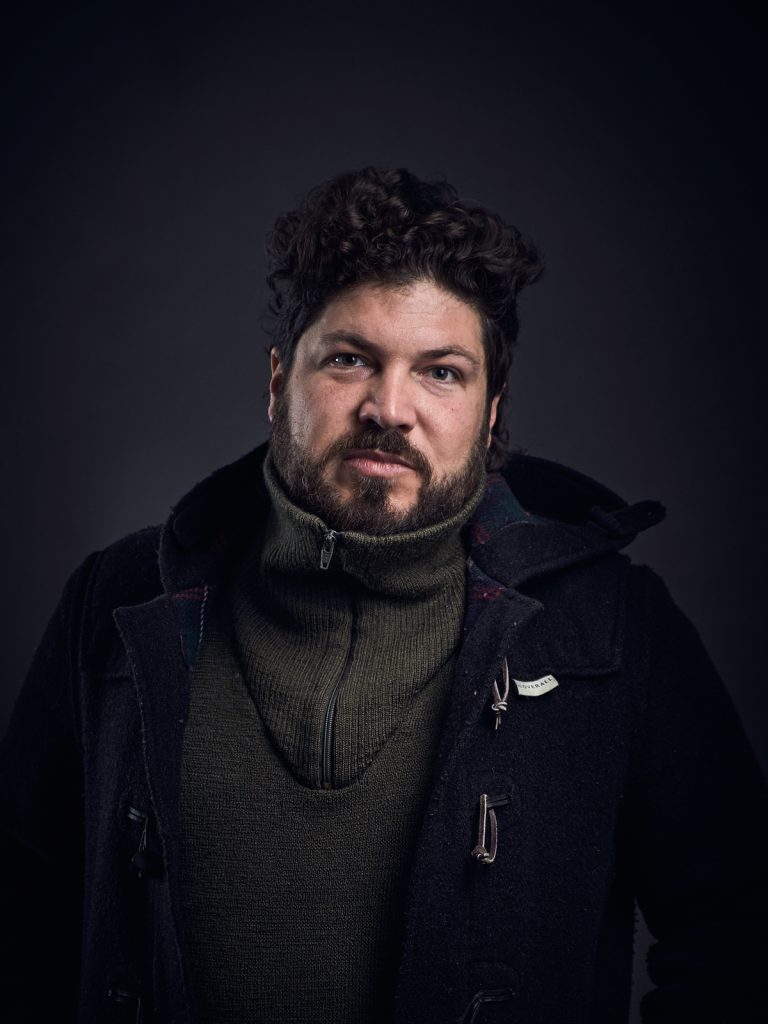
Finally, a big thank you to Nikolas Fabian Kammerer for the once again great, atmospheric photos of this meeting. Here he tells us how he perceived the shooting:
“The people at Shell Tapes love what they do. You can tell this even in front of the store in the lovingly decorated window in which various tape releases can be seen. Things get really nerdy in the actual “production rooms”, with what feels like a thousand cassette recorders, confusing cables and audio equipment connected to a network. That was a very exciting meeting with a really lovely crew!„
Source: https://www.frohfroh.de/41438/on-tape-1-shell-tapes


